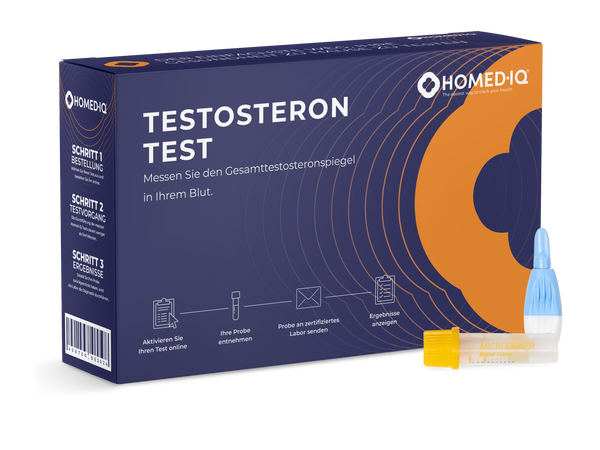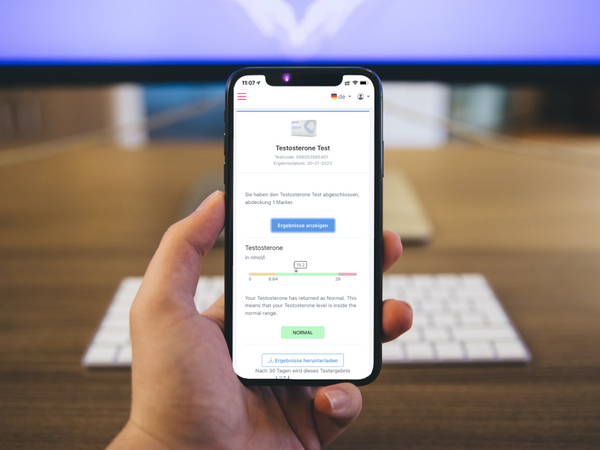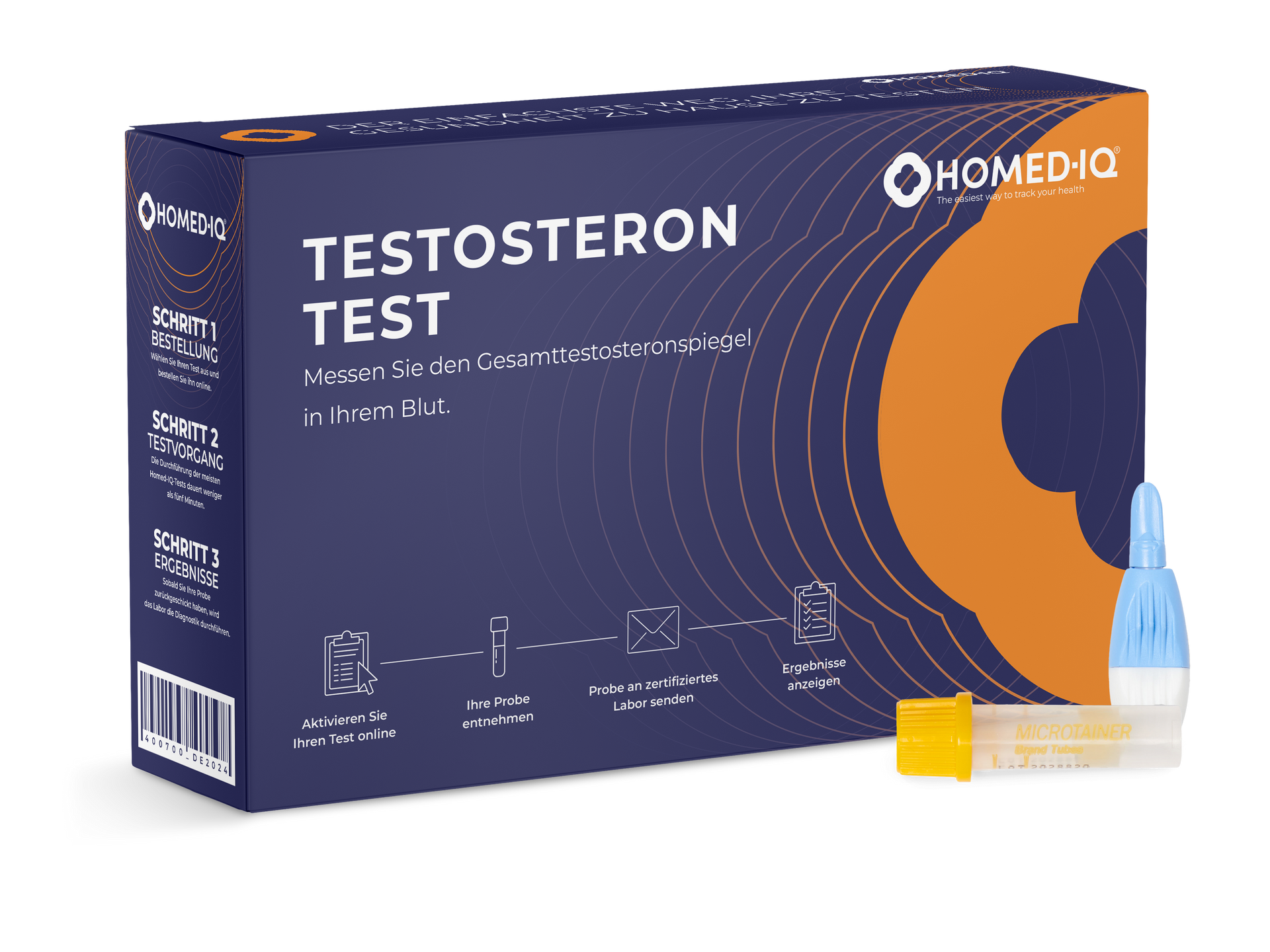Testosterone Test
FREE SHIPPING TO
Do you notice a decrease in muscle mass, lower libido, or increased fatigue and lack of concentration? This test measures the level of total testosterone in your blood and can be performed by men or women. Hormones impact almost all of our body systems and can cause a variety of symptoms if they are imbalanced. The results of this test can provide insight into how abnormal testosterone levels may be affecting your health.
Test mode:
Finger Prick test
Please note: the blood sample for this test must be taken before 10 in the morning, preferably following at least eight hours of fasting. This means you consume no food or drinks other than water.
What is a Testosterone Test?
This test measures the total testosterone level in your blood. Testosterone has a variety of functions in men and women, including regulating bone and muscle mass, red blood cell production, producing sperm and reproductive tissues, and maintaining a healthy sex drive. Testosterone that is either too low or too high can cause unpleasant symptoms that can go undiagnosed without hormone testing. Do you notice you have reduced muscle mass, lowered sex drive, increased body fat, or hair loss? Or perhaps you have acne, increased appetite and hair growth, weight gain, and mood swings? Use this test to gain insight into your hormone health and learn the potential cause of your symptoms.
How do I collect my sample for a Testosterone Test?
This is a finger prick test that can be collected at home. Your test kit contains all the necessary materials to collect your sample. Please note: the blood sample for this test must be taken before 10 in the morning, preferably following at least eight hours of fasting. This means you consume no food or drinks other than water. Always follow the advice of your healthcare provider with regards to fasting, particularly if you have any medical conditions.
Testosterone
Studies have found that approximately 40% of men over the age of 45 have low testosterone levels, and that total testosterone levels in young and adolescent men are declining over time. Since testosterone affects multiple body systems, identifying and treating a testosterone imbalance is important for health and wellbeing in men and women.
Testosterone is the primary sex hormone found in males and responsible for the male attributes gained in puberty such as a deep voice, body hair, and muscle mass. Testosterone is also present in women in lower levels, and influences bone and muscle mass, growth and repair of reproductive tissues, sexual function, and mood. Low testosterone in men and women can affect energy levels, muscle mass, strength, and concentration.
Total testosterone is a measurement of both the free testosterone and the testosterone that is attached to proteins in the blood. Since the symptoms of testosterone deficiency are often non-specific, checking your total testosterone levels with a blood test can give you insight into your hormonal balance and provide an indication if treatment is needed for testosterone imbalance.
Who should use a testosterone test?
You should consider taking this test if:
- You would like to learn if you have a healthy testosterone level
- You notice symptoms that could indicate a testosterone imbalance
- You constantly feel tired or have a low mood
- You take or have taken anabolic steroids or non-prescribed testosterone supplements
- You are obese
- You have a family history of low testosterone
- You have thyroid problems
What do the results of this test mean?
This test measures the total amount of bound and unbound testosterone in your blood. The results of this test can help determine whether you are experiencing abnormal testosterone levels and whether treatment, lifestyle changes, or further testing is needed to identify the root cause.
Symptoms in Women
Low Testosterone
- Thinning hair
- Low sex drive
- Fatigue
- Trouble concentrating
- Muscle weakness
- Reduced vaginal lubrication
Low testosterone can also lead to several health problems in women. These include:
- Osteoporosis (brittle bones)
- Infertility
- Depression
- Poor memory
High testosterone
- Excess body hair
- Balding
- Acne
- Increased muscle mass
- Deepening of voice
- Irregular menstrual cycles
- Low sex drive
High testosterone can also lead to several health problems in women. These include:
- Infertility
- Increased risk of diabetes and metabolic disease
- Increased risk of heart disease after menopause
Symptoms Men
Low testosterone:
- Fatigue or low energy
- Low sex drive or erectile dysfunction
- Lowered sperm count
- Hair loss
- Reduced muscle mass and/or increased body fast
- Anxiety, depression or trouble concentrating
Low testosterone can also lead to several health problems in men. These include:
- Osteoporosis (brittle bones)
- Infertility
- Depression
- Poor memory
- Obesity
High testosterone:
- Aggressive/irritable behaviour
- Acne
- High sex drive
- Increased muscle mass
- Excessive body hair
- Lowered sperm count
- Weight gain
High testosterone in men can also lead to several health problems. These include:
- Prostate enlargement
- Infertility
- High blood pressure
- Increased risk of blood clots
- Increased risk of heart attack
How does it work?
Order your test
Fast and discrete letterbox delivery
Activate & take your sample
Video instructions included
Laboratory analysis
ISO - Certified lab network
Receive your results
Easy access through mobile






